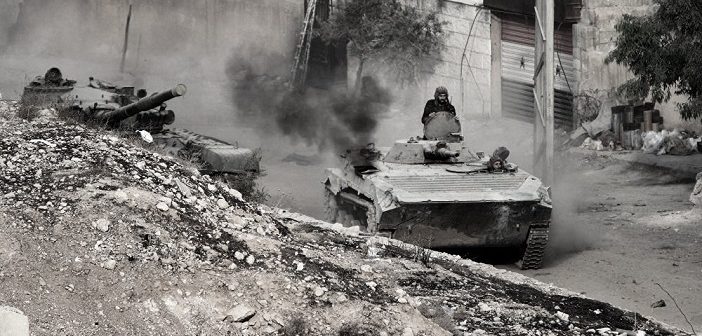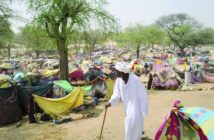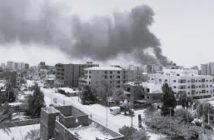The Trump Administration’s Syrian policy is just like its US internal political manoeuvrings. Because of this, it can be described swiftly: chaotic, unpredictable and gains for all his Syrian adversaries.
The July’s ceasefire-deal between the rebels and Damascus (but not between the rebels themselves) allowed time and tranquillity for al-Qaeda’s Syrian affiliate al-Nusra (Tahrir as-Sham which is taking the leadership in the Hayat Tahrir as-Sham –HTS– coalition) to raise its black flags in the most important rebel-held town, Idlib, fighting other rebel-groups which didn’t accepted its authority.
But more was and is to come.
The April-May negotiations were taking place between the Trump Administration, Russia (representing the Syrian government) and Jordan. It becomes increasingly difficult for the Pentagon or the Department of State to make an influence, apart than to take carry out Donald Trumps’ wishes.
Several times, during the spring, the US air force attacked and bombed Syrian regime forces who were “reaching too close” to the illegitimately set-up US rebel-training army base in the South of Syria, on the Iraqi-Syrian border in al-Tanf.
Since the 9th of August 2017, things have changed. Firstly, Trump decided to encourage the equipped and (badly) vetted rebel forces to relocate to the North of Syria and take part (with the Syrian Democratic Forces lead by the Syrian Kurdish groups, the YPG) in the fight against of Raqqa. They declined. Thereafter, the order was to attack the IS’ southern Syrian province and not focus on the Syrian army. They declined again. In any case, they were surrounded by Assad’s army by then.
Instead some rebel-groups defected to the Assad regime itself. Moreover, the Syrian regime-affiliated forces made massive gains all around the southern US base: they cleared more than 100 km2 around al-Tarif and now essentially control the entirety of the Jordan-Syria border, apart from a limited region south of Tarif.
In just a few days, the Syrian regime asserted its control accumulating 57km of length and 27 of depth. Now, the US-backed rebels don’t have any means to attack the Islamic State. Also, Jordan must have agreed to Syrian government controlled border themselves, as they’ve been outplayed, don’t want more refugees and are too weak internationally.
So, from shooting down Syrian airplanes, bombing regime convoys reaching close to the US base, the Syrian regime fooled all the parties in the conflict to widen its territory under control. Their experience in these exploits are based on their participation in the Lebanese civil-war.
What will happen to the al-Tanf US base now? Their trained moderate rebels are deserting to Assad, not willing to join the Raqqa battle and the remaining stuck in a tiny spot between Jordan and Assad who are surrounded by Islamic State territory. Moreover, this allows Assad to have multiple strategic choices on how to reach the IS besieged regime-controlled Deir ez-Zor town from several directions. That offensive is still ongoing and yesterday’s huge IS counter-attack in the desert was repelled. The regime has also linked up with Iraqi PMU’s (Shia militias supported by Iran) at the other border’s side.
Is the US giving up on the rebels in the south? Is Trump giving free-hand for the Syrian regime to reclaim its South-Western border? Only one way to follow Trump’s strategy: wait and see…






1 Comment
Your article including its title has a major factual inaccuracy. “US brokered ceasefire” is not the reason for the government being able to turn the tide on ISIS. Rather, it was the Astana deal brokered between Russia, Iran, and Turkey between the Syrian government and non Syrian Al Qaeda rebel groups, in particular those in Idlib and Homs provinces. The US was never invited t this, nor showed much interest. The US’s own influence is on the south near Israel/Jordan border and the ceasefire there came into effect much later. The Syrian government was already on a major campaign against ISIS and the southern front has seen a mere fraction of the fighting as compared to other fronts and was not a game changer by any means.